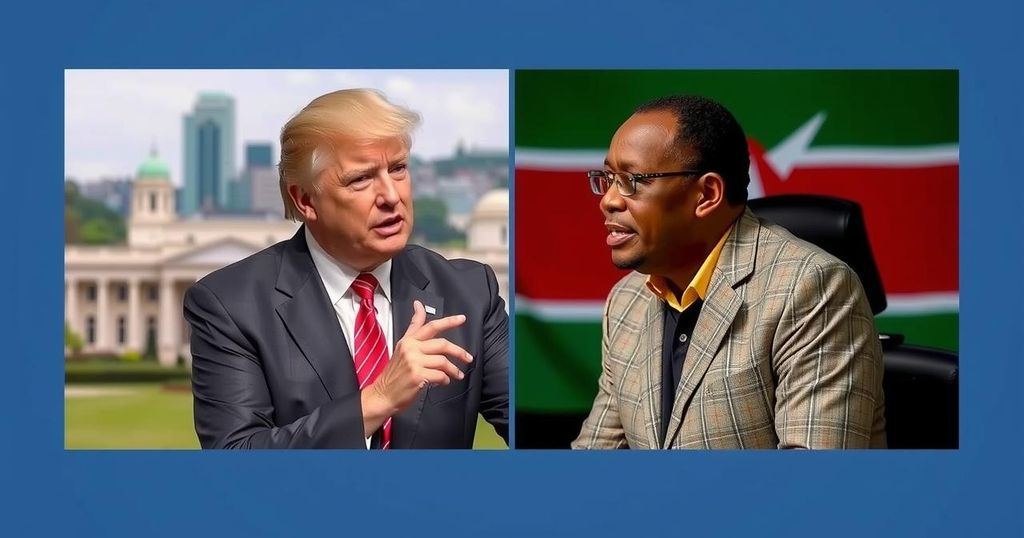Kenyan analyst Ahmed Hashi falsely accused the U.S. and Ambassador Meg Whitman of interfering in the upcoming AU elections, suggesting that they aim to derail Raila Odinga’s candidacy for AU Commission Chair. However, evidence shows Whitman has strengthened U.S.-Kenya relations, having supported Odinga’s candidacy and criticized the Kenyan president when warranted. The claims made by Hashi lack substantial support and do not reflect the actual diplomatic interactions observed.
The African Union (AU) is preparing for the election of its fifth commission chair scheduled for February 2025, following Moussa Faki Mahamat’s tenure since March 2017. Among the candidates is Odinga, a prominent Kenyan opposition leader who has garnered significant endorsement from seven African heads of state. Despite his high-profile candidacy, allegations have emerged from Ahmed Hashi, a Kenyan diplomatic analyst, stating that the United States, specifically Ambassador Meg Whitman, is allegedly intervening to impede Odinga’s election. Hashi claims that Americans will not permit Odinga to ascend to the role and insinuates that Mahamoud Ali Youssouf of Djibouti is preferred by the U.S.
Such assertions lack substantiation and contrast sharply with documented evidence illustrating that Whitman has fostered stronger diplomatic ties between the U.S. and Kenya. Following a meeting at the White House with President William Ruto on May 22, the U.S. recognized Kenya as a non-NATO ally, enhancing the bilateral relationship established over 60 years. Whitman, appointed in 2022, is known for her advocacy of the Kenyan tech sector and had previously accompanied the president to Silicon Valley, underscoring her commitment to Kenya’s economic development.
There has been a perception among some Kenyans that her collaboration with Ruto signifies unequivocal support from the U.S., labeling her as “Ruto’s new fixer.” Nonetheless, Whitman has maintained diplomatic integrity by publicly condemning Ruto when necessary, as demonstrated when she criticized his unfounded accusations against the Ford Foundation during a recent television interview. Furthermore, in May, she openly endorsed Odinga’s bid for leadership within the AU, reaffirming her belief that his election would be beneficial for East Africa.
In an unsubstantiated attempt to discredit Odinga’s relationship with the U.S., claims that he faced opposition from American entities throughout his life are unfounded. Despite previous electoral setbacks, Odinga has been a regular invitee to various international meetings involving U.S. leaders, reflecting a cordial relationship with both current and past U.S. administrations. Overall, the narrative suggesting U.S. meddling in the upcoming AU elections lacks credible evidence and overlooks the nuanced diplomatic interactions between the parties involved.
The African Union is a pivotal organization comprising 55 member states, aiming to promote unity and cooperation among its members. As it heads towards the election of its new commission chair in February 2025, suspicions surrounding foreign influence in these elections have surfaced. This particular dynamic has gained attention due to the candidacy of Raila Odinga, a seasoned opposition leader in Kenya, and accusations regarding U.S. involvement in his potential election outcome. These accusations raise critical discussions about the intersection of external diplomatic relations and domestic political processes in African nations.
In conclusion, while the upcoming AU elections are significant for the continent, the allegations of U.S. intervention to hinder Raila Odinga’s candidacy appear to be unfounded. Evidence illustrates that U.S. Ambassador Meg Whitman has not acted to interfere with Kenyan politics but rather has supported strengthening diplomatic relations. The assertion of persistent American opposition against Odinga lacks factual basis and serves more as a reflection of domestic political dynamics than actual foreign influence. Ultimately, the narrative requires a clear separation between personal political rivalries and the broader realities of international diplomacy.
Original Source: www.voanews.com






